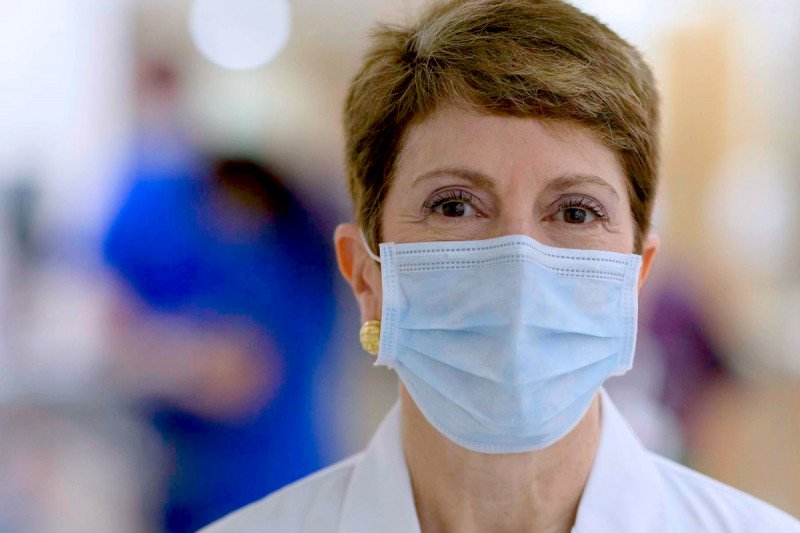
Physician-in-Chief Lisa DeAngelis Shares Why Patients Need to Get Back to the Clinic
At the 2020 American Association for Cancer Research (AACR) Virtual Meeting: COVID-19 and Cancer the overarching message echoed throughout the meeting was that cancer is not going away during the COVID- 19 pandemic. Cancer institutions need to be vigilant in their approach to getting patients safely back to the clinic so they don’t further delay their life-saving care.
Memorial Sloan Kettering (MSK) Physician-in-Chief and Chief Medical Officer Lisa DeAngelis, MD, is no stranger to this challenge. Since the surge of COVID-19 in New York City in early March, MSK has been committed to ensuring that patients have access to world-class cancer care, in a safe and healthy environment. Cancer isn’t sheltering in place, and neither is MSK.
During the AACR Virtual Meeting: COVID-19 and Cancer, Dr. DeAngelis participated in a panel discussion where experts from Fred Hutchinson Cancer Research Center, Sarah Cannon Cancer Center, University of North Carolina, and Vall d’Hebron University Hospital (VHIR) discussed how to safely bring patients back to the clinic so they can receive vital cancer screenings and care.
As Dr. Anthony Fauci emphasized in his keynote address during the meeting, the pandemic, and the coinciding nationwide lockdown in the United States and abroad, dramatically decreased appointments for routine cancer screenings. In fact, according to a recent study published in Science by Norman Sharpless, MD, director of the U.S. National Cancer Institute (NCI), COVID-19-related reductions in cancer screening and treatment over the next decade could result in 10,000 excess deaths from breast and colorectal cancer.
Dr. DeAngelis expanded on the importance of cancer screenings and early detection during her panel discussion, “The medical profession and the American Cancer Society have spent decades convincing the American public of how critical it is to have early diagnosis for cancer. That [early detection] can make all of the difference in the outcome [for the patient]. Dr. Sharpless has given us the estimates of what the toll is going to be in terms of late-stage diagnosis, and ultimately the inability to treat what might have been curable a year or two before.”
She continued by explaining that “a majority of people feel entirely well, [so they] don’t really feel the need to undergo a screening procedure and feel it’s safe to postpone. [However,] COVID-19 is here to stay, and we all have to learn to coexist with the coronavirus and yet continue all of the regular healthcare that is so essential.”
It is crucial for the public to schedule their cancer screenings, such as mammograms and colonoscopies, but many are scared to visit healthcare facilities right now. So how is MSK keeping patients safe, while continuing cancer care and research?
Testing
Dr. DeAngelis shared that “[MSK] implemented pre-operative and pre-procedure testing for every patient coming in. All admissions are tested, and of course, any patient who is symptomatic.” All MSK staff are tested frequently as necessary, and in many cases, caregivers for patients are tested as well.
In addition, MSK launched the Covid-19 Cohort Monitoring Program in March. Patients who test positive for the virus are automatically enrolled in this platform, which allows the team to track their symptoms over time, rapidly intervene if symptoms worsen, and monitor recovery.
To learn more about what to expect before and during your visit to MSK, visit Frequently Asked Questions About Coronavirus (COVID-19).
Telehealth
Telemedicine appointments are also available when appropriate for both initial and follow-up visits. MSK doctors work with patients to determine which appointments can be held via telemedicine.
Many other vital aspects of cancer research, such as clinical trials, have also continued using telehealth. Dr. DeAngelis explained that “[At MSK] we converted all of our clinical trial nurse encounters with patients to virtual visits. [This] enabled us to keep things going to some extent during the height of the pandemic [in New York City]. And now, we’re really looking to leverage this into the future. We’re looking to keep a lot of our clinical trials support infrastructure working remotely.”
To learn more about what to expect during your telemedicine appointment, visit here.
Safety precautions on-site
MSK has put in place the strictest safety measures to protect patients, caregivers and staff, including limiting the number of people in MSK facilities, spacing out appointments, enhancing cleaning efforts to disinfect and sanitize all high-touch and public areas, requiring all patients and staff to wear a mask at all times, providing curbside check-ins and virtual express check-outs, and much more.
To learn more about MSK’s response to COVID-19, visit here.